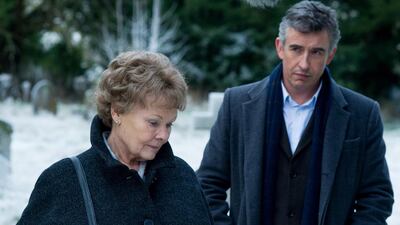There were cheers. There were sobs. There were ovations. And there were awards. To say that Stephen Frears’s Philomena brought the house down when it premiered last month at the Venice Film Festival is a considerable understatement. The Italians roared with approval at this touching real-life drama about Philomena Lee (played by Dame Judi Dench), an aged Irish lady searching for the son that was taken away from her when she was a teenager living in a Catholic convent.
With her son Anthony shamefully sold off by the nuns to a wealthy American couple, Philomena lived with this secret sadness for 50 years – not that you’d know it. “She gives no sense that there’d been this tragedy in her life,” says Frears.
Dench, who worked with Frears on 2005’s Mrs Henderson Presents, concurs, marvelling at this resolute lady. “To go through the search and come out as a much stronger person – I don’t think there are many people whose story that could possibly be.”
Dench, 78, met with the real Philomena for lunch before the shoot. “She’s very funny. Very Irish, which my mother was. Not that she was like my mother in any way. But she had many Irish friends that I saw a similarity with. And then the next time I met her, which was much more frightening for me, she came to my trailer. And I was ready, as her, to go and walk onto the set. That was very unnerving for me. And probably quite unnerving for her!”
With the film collecting Best Screenplay in Venice for its co-star/producer Steve Coogan and his co-writer Jeff Pope, hopes are high that this “pet project”, as Coogan calls it, will shine in the awards season. The movie mogul Harvey Weinstein paid US$7 million (Dh26m) for the US rights – and there can be no doubt he’s already scheming about how to steer Dench towards the second Oscar of her career. And there’s nothing the Academy likes more than an underdog story – especially one with politics and religion at its core.
Following on from Peter Mullan’s 2002 film The Magdalene Sisters, which dealt with “fallen” women put into prison-like workhouses in Ireland, it represents another scandal for the Catholic faith to face. “Right now, it’s not very difficult to attack the Catholic Church,” admits Frears. “They make it pretty easy. But the actual details of selling children, I didn’t know it. I don’t think anybody quite knew that.” It’s certainly no shock to see why those from the very Catholic Italians were so taken with the film.
The story is adapted by Coogan and Pope from The Lost Child of Philomena Lee, by Martin Sixsmith, the BBC journalist who accompanies Philomena on her journey. “It made me angry and made me sad,” says Coogan. “It chimed with me. It’s about a mother and a son – it’s so universal. Who can’t identify with this story?”
Then there were parallels with his life. “I’m a lapsed Catholic and I want to put something of myself into the story. The fact that Philomena still had her faith, I found interesting.”
With Coogan playing Sixsmith, it represents a considerable departure for him, from his comedy work in Britain – although Dench was left particularly impressed by her co-star’s dramatic abilities. “He’s a stand-up comic! How dare he be able to do that? I couldn’t go and tell a lot of jokes!”
As for the real Philomena, what did she think of the film? “The first time she saw it, she was a nervous wreck,” says Frears, smiling. “But then she saw it again and was very pleased. What she did was to trust people. I suppose she would say she wasn’t let down.”
• Philomena screens on Saturday at 6pm at Emirates Palace. For more information, visit www.abudhabifilmfestival.ae
artslife@thenational.ae

